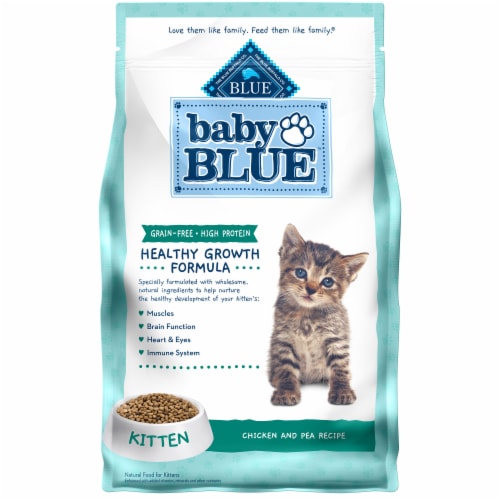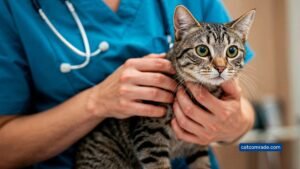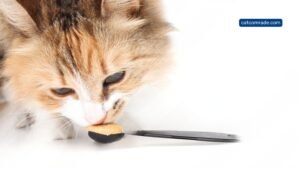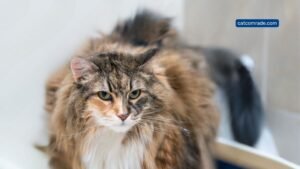What to Feed Mother Cat After Giving Birth: Essential Nutrition Tips

Your mother cat just gave birth, and now you want to make sure she gets the best care possible. What you feed her right after giving birth can make a big difference in her health and the health of her kittens.
You might be wondering, “What’s the right food? How much should I give her? Does she need anything special? ”
This guide will answer all your questions and help you give your cat the perfect nutrition she needs during this critical time.
Keep reading to discover simple, effective feeding tips that will keep your mother cat strong and her babies thriving.
Nutritional Needs Post-birth
After giving birth, a mother cat’s body needs extra care through proper nutrition. Her body works hard to produce milk and heal from delivery.
Proper food supports her energy and health. Meeting these nutritional needs helps her recover and care for her kittens well.
Feeding the right diet is key to keeping her strong and healthy in this demanding time.
Understanding her needs helps provide the best support during the post-birth period.
Increased Caloric Demand
Mother cats need more calories after birth. Producing milk burns a lot of energy. Their daily calories can double or triple.
High-calorie food helps maintain her strength. Feeding richer meals supports her increased energy use.
Essential Nutrients For Recovery
Protein is vital for healing and milk production. Fat helps provide extra energy and supports brain health.
Vitamins and minerals like calcium and phosphorus rebuild bones and muscles.
Balanced nutrients speed up recovery and keep her healthy.
Hydration Importance
Water is crucial after birth. Milk production requires a lot of fluids. Dehydration can cause serious health issues.
Always keep fresh water available nearby. Proper hydration aids digestion and overall health.
Best Food Choices
The best food choices for a mother cat after giving birth support her health and milk production.
Good nutrition helps her recover faster and care for her kittens. Focus on meals that provide energy and essential nutrients.
Choose foods that are easy to digest and rich in important ingredients. These foods keep her strong and ready to nurture her new babies.
High-quality Protein Sources
Protein builds and repairs body tissues. It is vital for a mother cat’s recovery. Offer foods with real meat like chicken, turkey, or fish.
These provide complete proteins with all needed amino acids. Avoid fillers like corn or soy.
Wet or dry cat food labeled for growth or all life stages usually has good protein levels.
Balanced Fat Content
Fat gives energy and supports healthy skin and coat. Mother cats need more calories during nursing.
Choose foods with moderate fat amounts from animal sources. Omega-3 and omega-6 fatty acids help brain and eye development.
Fish oils or flaxseed are good additions. Avoid foods with too much fat, which can cause digestion problems.
Vitamins And Minerals
Vitamins and minerals strengthen the immune system. Calcium and phosphorus help build strong bones for mother and kittens.
Vitamin A supports vision and skin health. Vitamin E acts as an antioxidant.
Offer balanced cat food or supplements made for nursing cats. Fresh water must be available at all times to aid nutrient absorption.
Feeding Schedule And Portions
After giving birth, a mother cat needs a special feeding schedule and proper portions. Her body uses a lot of energy to feed her kittens.
This means she needs more food and the right nutrients. A good feeding plan helps her stay healthy and care for her babies well.
Frequency Of Meals
Feed the mother cat small meals often. Offer food at least four times a day. This keeps her energy steady and supports milk production.
Avoid giving one or two large meals. Frequent meals help her digest food better and feel comfortable.
Portion Size Adjustments
Increase food portions gradually after birth. The mother cat may eat twice or three times her usual amount.
Watch her body and energy levels to find the right portion. Avoid overfeeding, but do not let her stay hungry.
Balanced portions help maintain her strength.
Monitoring Appetite Changes
Pay close attention to changes in her appetite. Some mother cats eat more at first, then less later.
Loss of appetite can signal health problems. Keep track of how much she eats each day.
Contact a vet if she refuses food for more than a day.
Special Dietary Considerations
After a mother cat gives birth, her diet needs special care. Proper nutrition helps her stay healthy and produce enough milk.
The food must support her energy and recovery. Some foods can harm her or her kittens.
Others can help with health problems. Knowing what to add or avoid is very important.
Avoiding Harmful Foods
Certain foods can be dangerous for a mother cat. Avoid chocolate, caffeine, and alcohol. These cause serious health issues.
Raw meat and eggs can carry bacteria. Keep her away from onions and garlic. They can damage her blood cells.
Also, do not feed her bones or spicy foods. These can cause choking or upset stomach.
Supplements And Additives
Supplements can support a mother cat’s diet. Calcium helps with milk production and muscle health.
Omega-3 fatty acids improve her coat and brain function. Use supplements made for cats only.
Avoid giving human vitamins without vet advice. Some additives help her digestion and immune system.
Always check with a vet before adding anything new.
Addressing Health Issues
Watch for signs of illness or weakness. Loss of appetite or low energy needs attention.
A vet can recommend special diets for health problems. Sometimes, mother cats need food for anemia or infections.
Balanced meals improve healing and strength. Early care helps prevent serious complications.
Keep water fresh and plentiful for hydration.
Transitioning Back To Regular Diet
After giving birth, a mother cat needs special nutrition to recover and care for her kittens.
Once the kittens start eating solid food, the mother can slowly return to her regular diet.
This transition must be smooth to avoid upsetting her digestion and to keep her healthy.
Gradual Food Changes
Switch her food gradually over 7 to 10 days. Mix a small amount of regular food with her current diet.
Slowly increase the regular food portion each day. This helps her stomach adjust without problems.
Sudden changes can cause diarrhea or loss of appetite.
Signs Of Readiness
Watch for signs that she is ready to switch. She should be eating less kitten food and more solid food.
Her energy levels will start to return to normal. If she shows no signs of stomach upset, you can continue the transition.
Always check her weight and overall health during this time.
Maintaining Long-term Health
Choose a high-quality cat food for her regular diet. It should have balanced nutrients for adult cats.
Keep fresh water available at all times. Monitor her weight and body condition regularly.
Regular vet check-ups help catch any health issues early. A healthy diet supports her well-being and longevity.

Credit: petsqtr.com

Credit: www.ncobraz.ru
Frequently Asked Questions
What Food Is Best For A Mother Cat After Birth?
A mother cat needs high-quality, protein-rich food after birth. Wet kitten food is ideal as it supports milk production and provides extra calories.
How Often Should A Mother Cat Eat After Delivery?
Feed the mother cat small, frequent meals throughout the day. She needs extra energy to nurse her kittens and recover from birth.
Can Mother Cats Eat Kitten Food Postpartum?
Yes, kitten food is perfect for mother cats after birth. It contains higher protein and fat levels to meet their increased nutritional needs.
Should I Give Supplements To A Mother Cat After Birth?
Generally, a balanced diet is enough. Consult your vet before adding supplements to avoid overdosing or nutritional imbalances.
Conclusion
Feeding a mother cat well helps her stay healthy and strong. She needs food rich in protein and nutrients to make milk.
Fresh water must always be nearby. Avoid sudden food changes to keep her stomach calm. Watch her appetite and energy for signs of health.
Good care supports both mother and kittens. Simple, balanced meals make a big difference.
Keep feeding her right, and she will care for her babies well. Taking these steps ensures a happy, healthy family.






